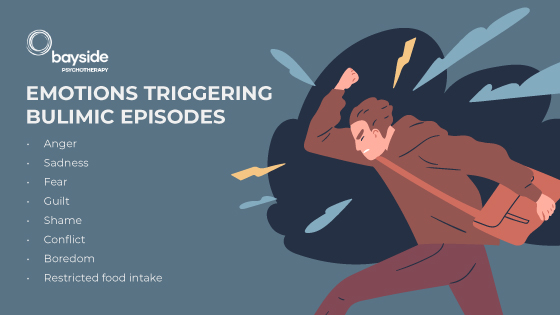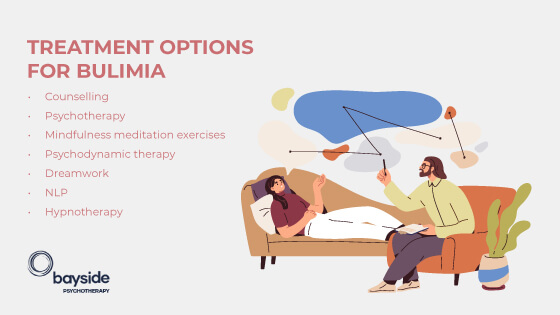What is Bulimia Nervosa?
Bulimia nervosa is a severe condition involving episodes of binge eating, followed by some compensatory behaviour such as self-induced vomiting, use of laxatives, excessive exercise and fasting to avoid weight gain. An episode of binge eating is characterised by consuming a portion of food that is higher than most people would eat during specific times.
One of the major symptoms of bulimia is that people often feel out of control during their bulimic episodes and may report zoning out or mildly dissociating. Individuals with bulimia tend to obtain their self worth from their body image such as body shape, appearance and weight.

What Triggers Bulimic Episodes?
Bulimic episodes are commonly triggered by emotions appraised as unpleasant or threatening (such as anger, sadness, fear, guilt and shame), interpersonal difficulties (such as conflict), boredom and after long periods of restricted food intake.

What Are Some Treatment Options of Bulimia?
Approaches applied to eating disorders are tailored to your needs at Bayside Psychotherapy. Your course of treatment for bulimia will depend upon what we consider most appropriate and may include one or a combination of counselling, psychotherapy, mindfulness meditation exercises, psychodynamic therapy, dreamwork, NLP or Hypnotherapy.
In addition to individual bulimia psychotherapy, there is also a Bulimia Hypnosis Download and various community-based resources available.
The first step is to make an appointment.

Don’t let Bulimia take over your life and harm your health!
Do you have any questions for us? Get in touch with us through our online contact form.
Call Bayside Psychotherapy on (03) 9557 9113 to find out if we’re able to help you. Your call is completely confidential, and there’s absolutely no obligation.
You can also book an appointment by using our online booking form for online appointments. Or, if you prefer, you can book an in-clinic session.
Self-hypnosis may also work well when used in conjunction with counselling. You can download our Bulimia Nervosa Self Hypnosis recording from our website.
Ready to begin therapy for bulimia?
Connect With a TherapistBulimia Nervosa – Frequently Asked Questions
Is Bulimia Nervosa Dangerous?
Like all eating disorders, bulimia is a severe illness. It can permanently damage your body and can even be deadly.
People with bulimia will often eat large amounts of food, binge, and then try to get rid of the calories in a purge. This usually involves vomiting, excessive exercising, or abuse of laxatives or diuretics. This cycle of behaviour can cause problems in all parts of your body.
Bulimia also affects your brain and is often linked to mental health problems like anxiety and depression. But you may be able to get help. There are many treatment options that may help the cycle of bingeing and purging.

What Are Some of the Causes of Bulimia?
Bulimia is a complicated illness that has many underlying causes. Every case is unique to the individual, and there are some common, but not universal, features that bulimic individuals may share, including:
experiencing childhood abuse (physical, sexual, emotional) that may or may not be consciously remembered. Growing up in a chaotic and dysfunctional family (for example, growing up with a mentally ill or an alcoholic parent; or experiencing “role reversal” where, as a child, you had to care for your parents). Growing up in a family where warmth and empathy are lacking, or the flip-side with excessive involvement from a parent. Growing up in a family where parents have high expectations of their children and are focused on how the family appears to the outside world.
Experiencing any of the above can give rise to additional characteristics seen in many bulimics, including:
- Difficulties with trust
- Depression and anxiety
- Low self-esteem
- Poor impulse control
- Difficulty tolerating distressing feelings
- Having feelings that are perceived as “wrong.”
- Social isolation and loneliness
- Relationship difficulties
What Are Some Treatment Options?
The current research base suggests that cognitive behaviour therapy (CBT) principles, particularly CBTE, are a useful place to begin treating bulimia. CBT involves exploring the link between thoughts, emotions and behaviours to help individuals develop greater insight into how this process is related to their bulimic symptoms. Early treatment may involve psychoeducation, goal setting, enhancing insight and starting to build more adaptive skills to cope and respond differently to the bulimia triggers. There is also evidence to suggest that psychodynamic psychotherapy which aims to explore how unresolved difficulties from the past are playing out in the present is at least as effective as CBT in treating bulimia.
Online counselling, psychotherapy or hypnotherapy sessions are conducted securely online using video conferencing software from the privacy and comfort of your own home. This medium may have advantages over face to face sessions sometimes leading to more openness during sessions.
Call us on (03) 9557 9113 or use our contact form to enquire, or book your confidential online therapy appointment right now.
There’s also an option to come into our Highett clinic for face-to-face appointments.
How Long will Counselling Take?
Usually, after a few sessions, we may be able to assess how therapy is helping, which may give us a clearer idea of how long to estimate treatment sessions for lasting change to occur. While occasionally individuals may experience symptom reduction after some short term therapy, many individuals with eating difficulties find long term therapy is required to help work through the underlying triggers and causes.
Feel free to visit our FAQ page for pricing and other relevant details.
Call Bayside Psychotherapy in Melbourne on (03) 9557 9113 to find out if we may be suited to assist you. Your call is completely confidential, and there’s absolutely no obligation.
Alternatively, if you are ready to commence online or face-to-face therapy with one of our qualified professionals you can book online now.
Note: This information is informative only and is not to be used for diagnosis or substitution of appropriate assessment and/or treatment by a registered practitioner. Information on this page and our entire site should not be construed as implying that our therapists are specialists in treating any condition whatsoever. While some of our therapists may have experience working with people suffering from a specific condition, not all of our therapists do. We do not guarantee any particular level of performance, cure or management of symptoms. Each case is unique and responds differently with collaboration between client and therapist being crucial. Always seek appropriate assessment from a qualified professional such as a GP, psychiatrist, clinical psychologist or social worker especially if you are acutely distressed.
Here are a couple of blogs written on this topic you might find useful:
How To Stay Motivated To Manage Bulimia
Bulimia: Fuelled by Social Media








